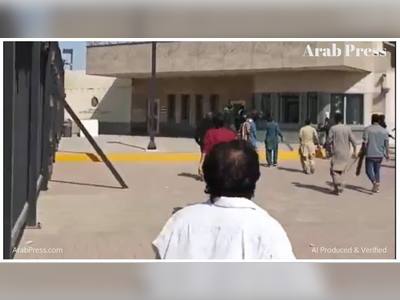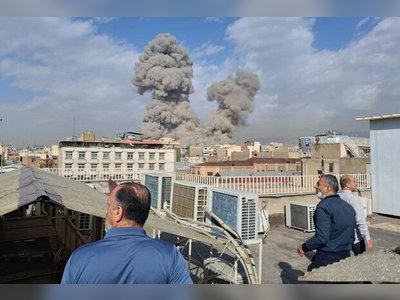
A conversation with KAUST president on AI + X: Untapped Synergies Between AI and Science Frontiers
The president of KAUST appeared on the first day of the summit, which started on Tuesday, through a direct dialogue with Oliver Barrett (founder of Connector Unit). He said that artificial intelligence contributed to the development of industry, innovation and infrastructure, and solving global problems.
He stressed that the LSTM memory technology helped in predicting the risks of cardiovascular diseases, and the discovery of the Corona virus from X-ray images and CT scans. He explained that a member of the faculty at KAUST, Professor Zin Gao, had developed the first fully automated system based on artificial intelligence to diagnose infection with the COVID-19.
Q: Which are the most critical and high-impact frontiers, humanity faces today?
A: One can say that we are today simultaneously at our highest and lowest point of human history. I guess this is one of the many paradoxes of our generation. On the one hand, we have accumulated so much knowledge and we have advanced technology, such that some grade school kids today may know more math, science and technology that college graduates of many decades ago. Our economy is digitizing, our health is personalizing, and we are enjoying comforts of life that even science fiction books failed to imagine in the past.
And yet, we are also confronted with global problems that we can’t seem to get ahead of. The challenges humanity faces today are happening at colossal scales and rates that demand so much from our global society, our governments, the private enterprises and us as citizens of this planet. I am talking about climate change, energy transitions, cyberthreats, food scarcity and starvation, environment and health threats, and the list goes on.
Indeed, look no further that our dismal failure to reach our UN Sustainable Development Goals. We are not able to reduce by half the proportion of people in poverty; we are not ending hunger; we are not ensuring the free education of children; and we are faring poorly in conserving and sustainably using our energy, water and mineral resources. The biodiversity of our planet is on an alarming decline and our life support system: our land, atmosphere and oceans, and even the polar ice caps are worsening by the day.
Q: How can AI and robotics help to achieve success?
A: Now this question is getting into why an institution like KAUST can be a real partner of the Kingdom (and the world) in helping address our global challenges. The earlier events this morning already highlighted what we at KAUST are doing in what we call the “AI + X” space.
Let me just highlight one example, from where we can all glean the power of AI in solving global problems embodied in our SDGs.
Our keynote speaker this morning, Prof. Juergen Schmidhuber of KAUST is the acknowledged originator of “Long Short-Term Memory” (LSTM), and indeed his unsupervised pre-training for deep recurrent neural networks (NNs) led to the first gradient-based deep learners.
Today, applications of the LSTM paradigm are pervasive in speech recognition, visual pattern recognition, medical imaging, machine translation, smart assistants on smartphones and many other applications.
The most obvious SDG impact would be in SDG 9 through automation and other innovations of our Industry and Infrastructure sector.
With respect to SDG 3 (Good Health and well-being) there are transformative LSTM applications for cardiovascular disease risk prediction, COVID detection in X-ray images and CT scans. In fact, one of our faculty members (Xin Gao) developed the first fully automatic AI-based system for COVID-19 CT-scan diagnosis, segmentation and quantification. The same AI method has been employed in radiogenomic evaluation of breast cancer!
Impact on SDG 2 (Zero Hunger) can also come in the form of LSTM-NN applications in forecasting rice cultivation and a wide range of environmental predictions that will improve agricultural production. Suffice it to say that LSTM-NN touches just about every SDG goal through the power of its application.
I should say that Juergen and I just recently introduced a funding program at KAUST intended to connect AI ideas and concepts to frontier applications in science and engineering. As I speak, we have at least 30 different directions taken by our KAUST faculty in the “AI + X” space.
Our objective here is not just to expand AI applications, but rather also improve AI ideas and concepts through the applications themselves. Let me clarify. KAUST is fortunate to be pushing the frontiers in sectors of energy, food, environment, health and many others. Unique and extensive data sets are gathered through extensive measurements and experimentation, large-scale observations (e.g., health-related data) at high resolutions.
As they say, data is the new oil, and unique and extensive data sets are an irreplaceable asset for refining AI ideas and concepts. Such is the case for instance in an initiative under our Smart Health Initiative aimed at tackling monogenetic (i.e., caused by a single gene) diseases in the Kingdom. This work is a collaboration between KAUST and the King Faisal Specialist Hospital & Research Centre. The idea is to harness “Big Data” comprising genomics, social and behavioral, sensors, environmental, family history and a dozen others.
The approach is to employ machine learning to understand and establish personalized and precise diagnosis and treatment avenues for monogenetic diseases. Success in this effort will bring immeasurable impact in health care in the Kingdom and beyond.
On the other hand, the availability of extensive database and the ability to confirm diagnosis/outcomes allows one to continuously improve the algorithms or even the whole concept behind our machine learning approach.
But beyond the power of data that I just talked about, our Smart Health Initiative is actually investigating what the basic science of brain function can teach us about AI. For example, understanding how GLIA cells can coordinate its interaction and function with its cell network is an on-going pursuit by Pierre Magistretti and others.
They tell me that the GLIA cell’s energy requirements for executing complex network coordination is a model to behold for AI computing. Our aim here is to explore how the features and principles of GLIA cell processes can inform artificial neural network enabling even more powerful, precise and energy-conserving AI and ML.
I did not even get a chance to address the “robotics part” of your question. Suffice it to say that the area of robotics and autonomous systems are of much interest to KAUST, particularly as these apply to environmental sensing and environmental protection and conservation. Think of a Red Sea that is sufficiently instrumented, with underwater sensors, cameras, with communication network, and big data processing capability.
This will enable real time observation and detection of trends and emergent threats and indeed gives us the ability to generate a Red Sea digital twin. This is the Red Sea of the future, and one that KAUST is prepared to help enable with our partners at MEWA, NEOM, TRSDC, Aramco and others.
Q: How will AI affect our vision of education, skills, human capacity and talent?
A: Let me state an obvious fact: KAUST is a university. As much as we seek AI applications for the common purposes of life, “teaching kids” is our business. Hence the teaching of AI and the utilization of AI to improve teaching and learning are amongst our top priorities.
This is why our Provost, who himself is an AI expert, led the discussion earlier today with our partners from SDAIA to discuss human capacity development. I will not repeat many of the wonderful points already raised, but I will highlight the fact that as we established our AI Initiative under the leadership of Juergen, educational development and an upskilling strategy for AI are amongst the central pillars of the Initiative.
Indeed, beyond teaching and training, we have also incorporated outreach to local, regional, national and international network as part of our AI plan. There is enormous demand for AI courses and training in the KSA, hence AI courses tend to be the focal points of teaching and outreach activities.
Let me switch gears and now talk about how pedagogy and the role of educators are already changing because of AI. AI tools are being developed and applied worldwide that now allows AI- assisted teaching and evaluation. Indeed, the ability to constantly evaluate learners’ lesson mastery enabled by AI is enabling bespoke teaching scope and learning pace that are commensurate to individual students’ skills.
A natural extension of student evaluation would be the application of so-called “empathetic technology” or the ability to read body language. Whereas there are those who would be cautious about use of this technology, I know that we all matter-of-factly sense other people’s body language when we interact with them, and I was very sensitive to this as a teacher at UCLA.
It isn’t hard to read student’s body language with respect to their subject comprehension or even their “Eureka moments.” I think that empathetic AI technology will further help refine assessments in support of bespoke pedagogy.
Of course, the idea is not to replace teachers but to empower them to offer personalized education to their students.










